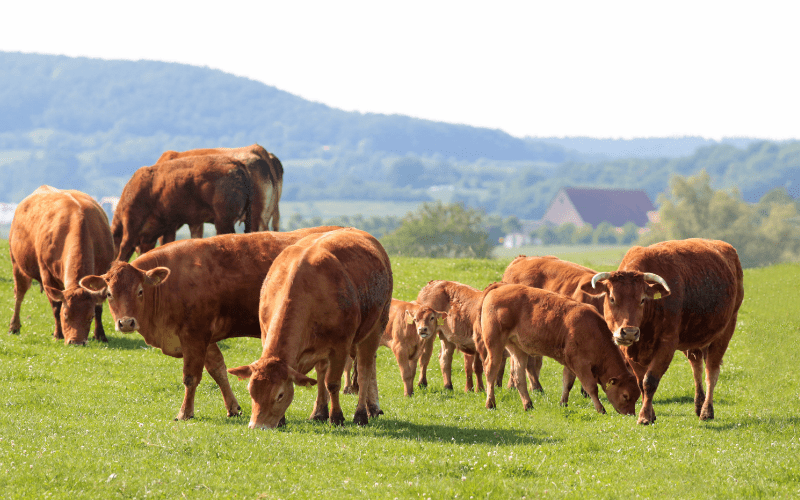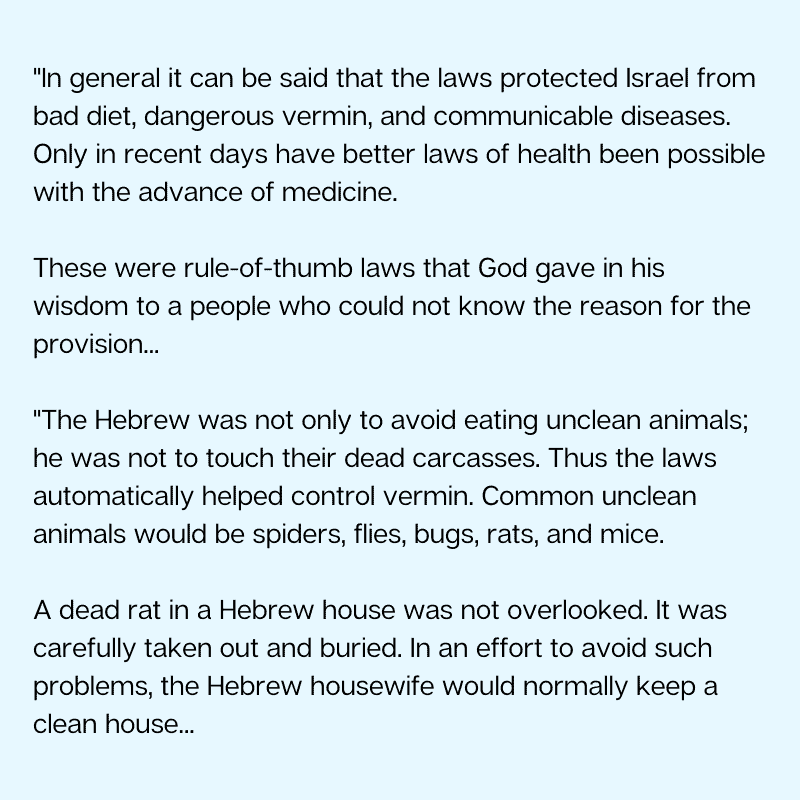Should a Christian Eat Pork? Introduction
This is a great question that actually affects Christians who might doubt the wisdom of eating pork or doing so on a regular basis. This is to be understood under the same principle of another question commonly asked, “Should a Christian eat shrimp or other shellfish?”
Under the Mosaic law in the Old Testament, the Israelites were prohibited from eating pork and other animals. This prohibition is found in the book of Leviticus, where God says:
“The pig has evenly split hooves but does not chew the cud, so it is unclean.”
(Leviticus 11:7)
As Christians, we are no longer bound to the ceremonial laws of the Old Testament. If you want to eat a pork chop, there is no Biblical prohibition for New Covenant Christians that would require them to abstain from pork. So, morally – yes, a Christian may eat pork.
2 Perspectives
These may just be personal perspectives, however, there has been quite a been of writing on what I’m going to mention here. There isn’t a doubt about the freedom that we have to eat pork, shellfish, and other foods forbidden by Mosaic law. However, we will ask the question later if there were/are health perspectives of some of those prohibited animals.
As a Christian, you should have the desire to keep God’s moral standards – not of duty, or for our salvation. Living by God’s grace the Spirit inside you will not want to violate the spirit of the moral law such as the 10 commandments.
But, our righteousness has nothing to do with keeping any kind of law. The Apostle, Paul spent a lot of time writing to churches about living in God’s grace and the New Covenant rather than by the Law. Jesus told us that He had not come to do away with the law, but to fulfill it. This is found in the book of Matthew when Jesus said:
“Don’t misunderstand why I have come. I did not come to abolish the law of Moses or the writings of the prophets. No, I came to accomplish their purpose.” Matthew 5:17
So, do I have some good old southern BBQ pork sometimes? Yes, I do. Do we bake the occasional pork chop? Occasionally. I remember my mother, who was a strong Christian, cooked fried pork chops quite a bit when we were young.
So, I guess we can just say, “Yes, it’s fine for a Christian to eat pork.” In essence and in morality, that is absolutely correct. We do not believe that it is a sin to eat pork.
However, there is another side of the story that may have some merit and only you can decide for yourself. First let’s take a general look at the animals that God allowed and did not allow for His chosen people in the Old Testament, the Israelites.
The primary scripture passages are found in the book of Leviticus, chapter 11, and also in Deuteronomy chapter 14. However, let’s not forget that, even before the Mosaic law, Noah was asked to bring some clean and unclean animals on board the ark. So, as to God pronouncing certain animals clean and unclean, the Mosaic Law wasn’t the first time. In Genesis we find God telling this to Noah:
“Take with you seven pairs—male and female—of each animal I have approved for eating and for sacrifice,[a] and take one pair of each of the others.” Genesis 7:2
Some, or a lot of the explanations for the dietary laws were not just ceremonial, but spiritual in nature, as God want His people to be set apart from others and demonstrate that. These were acts of obedience as they were to adhere to these laws.
Do you remember the passage where Peter has the dream and is confronted by God about what to eat – about what was clean or unclean? He had the vision of the unclean animals and he refused to eat. He was told to eat and he declined. God was not satisfied with that answer and reminded Peter that he could not call clean what God now has made clean. Look at this passage. It’s quite obvious that God has given us the okay to eat pork and other things that were formerly unclean.

Should a Christian Eat Pork? First – “Clean” vs “Unclean” Animals
To even debate the topic should a Christian eat pork, we need to take a look at the animals that God’s law commanded as ceremonially unclean.
Land Animals

Animals must have cloven (divided) hooves and chew the cud. These are animals that “chew their cud.” Although, much more technical, returns partially digested food from their stomach so that it can again be chewed again. These animals in this category would include animals such as cattle, deer, elk, antelope, goat, buffalo, sheep, and many others.
On the other hand, pigs, camels, rabbits, squirrels, and animals with uncloven hooves that do not chew their cud do not qualify as being ceremonially clean.
While we are here let’s take a look at fish and birds as well.

Fish & Aquatic Animals
As for fish that are were allowed as clean, these would all have fins and scales. for this reason, the Law allowed for fish such as cod, salmon, trout, and tuna in the clean category. Other aquatic animals such as lobsters, clams, oysters, crabs, shrimp, and catfish are not in the clean category.

Birds – Are They Clean or Unclean?
Well, those of us in the U.S. would most likely never consider eating one of our national symbols.
Finishing out with the bird category the clean category according to Old Testament Law be birds like chicken, turkey – (yay!), dove, and quite a few others such as duck and quail. In the unclean category, you would find birds that you probably wouldn’t eat anyway like vultures, hawks, ravens, buzzards, falcons, owls, seagulls, and quite a few others.
Should a Christian Eat Pork or Other Unclean Animals? Yes, But Decide If it Is Wise.
The Father, the Son, and the Holy Spirit were present as the Trinity and were the source of these dietary laws that were written for the Jewish people. My question is, and has been – why? Why did the God of the universe see that it was wise for a certain group of people to abstain from certain meats while allowing plentiful eating of others?
Once again – no, we are not morally obligated to those laws. You can go and enjoy a shrimp cocktail if you would like. I might have more trouble abstaining from shrimp, especially at a seafood feast on the beach!!
But, as we ask the questions about Christians eating pork and other unclean animals, could it be that these prohibitions were more than just ceremonial? Did they have a health purpose?
Were there Health Reasons Involved? Are They Still Applicable?
So, with what we know about God calling many animals ceremonially clean and unclean, it begs the question. Was it more than ceremonial? Was God looking out for the health of the Israelites when the world’s conditions of cleanliness and sanitation weren’t as modern as they are in today’s society?
The Expositor’s Bible Commentary gives some thoughts about the dietary laws:

Many theological and medical experts have weighed in to support the idea that the dietary laws were also for health reasons as well as ceremonial reasons. There are examples of the dietary laws in the old testament being way ahead of the “science” of that day. For instance, the idea of avoiding animal fat is compelling. However, it was thousands of years before our science caught up with the fact that animal fat could be bad for you.
You may have heard this type of argument because it is quite common – don’t eat the shrimp, lobster, catfish, etc., because they are bottom feeders and clean up the garbage on the floor of the sea or other bodies of water. The argument is made that these aquatic animals eat the trash so they certainly aren’t good for you.
I don’t know. However, I do wonder – could it be that 50 years from now scientists will find some unknown or strange chemical or toxin in shrimp or lobster that has been unknown? Maybe so.
As to – should a Christian eat pork, the bottom feeder argument comes to a land animal. Pigs are notorious for eating all sorts of garbage. They are quite the bottom feeders of the land animals – so to speak.

David Meinz, who is a professional personal health advocate is one of those who go along with this train of thought. He stated:
“Almost all of the creatures on the unclean list are scavengers,” he notes. “In many cases they don’t hunt for their own food; they eat the dead and decaying matter of our environment. A catfish does that at the bottom of a pond; lobsters and shrimp do it in the ocean. A pig will eat anything. Vultures, almost by definition, are known for their scavenger habits.”
David Meinz
So, was God providing protection for men and women – particularly for that point in history?
In “What The Bible Says About Healthy Living,” Dr, Rex Russell had this to say:
“As we look at modern science and nutrition, we will find that…there is an amazing overlap between God’s original laws of clean and unclean and solid hygienic principles…Scripture and medical research agree that modern lifestyles lived without reference to God’s laws and design shorten life and hasten death.”
Back to Should a Christian Eat Pork – Dr, Russell goes on to say:
“One reason for God’s rule forbidding pork is that the digestive system of a pig is completely different from that of a cow. It is similar to ours, in that the stomach is very acidic. Pigs are gluttonous, never knowing when to stop eating. Their stomach acids become diluted because of the volume of food, allowing all kinds of vermin to pass through this protective barrier. Parasites, bacteria, viruses and toxins can pass into the pig’s flesh because of over-eating. These toxins and infectious agents can be passed on to humans when they eat a pig’s flesh.”
I remember years ago as I read some of Dr. Don Colbert’s writings about healthy eating as a Christian. Here is one more quote from one of his books:
“Besides being gluttons, swine are also extremely filthy animals. They will eat garbage, feces, and even decaying flesh. All that is eaten usually becomes part of the pig’s own flesh…Aside from the diseases routinely carried by swine, pork is also a very fatty meat. The toxins in pork are held especially in the fat, which is not isolated from the meat as can be the case in lean beef, but rather, it is dispersed throughout the meat”
From “What Would Jesus Eat?” By Don Colbert, M.D.
I am no doctor or a nutritionist, not even close. However, I think that, at least in those early days, we might consider a part of the prohibitions to be for health concerns. Maybe now some of it would just be common sense. Would you dare eat a grilled vulture? I wouldn’t because I know what they eat. I wouldn’t eat a rat. I wouldn’t eat many of the things that are on the unclean list just for common sense’s sake.
So, I’m not going to rule out all of these physicians and nutritionists who believe that there is still wisdom in approaching the former unclean meats with caution. As we look at Peter’s vision above, I have never interpreted that vision from God to be necessarily about what Peter’s menu had to consist of.
He was telling Peter that the law was fulfilled and that Peter and all other believers were no longer bound to the Mosaic Law. They WERE free to eat what had formerly been called unclean.

My question is to how much and to what extent and, are some of the animals more healthy than others?
I could quote many more sources where good, qualified men and women believe that the dietary laws of the old testament served, and still can serve as good eating practices. But, not as a moral imperative.
However, since it looks like God, Himself told Peter that he could eat what Peter undeniably would never have eaten. Why would He take the prohibition off if there were health reasons involved?
I’m just a minister who has served churches for years and not a theologian of great proportions. The answer to some of this lies well above my pay grade.
Should a Christian Eat Pork – Summary
I know that we looked at a range of animals and not just pork and I thought it best that we do that. I may have raised more questions than I answered.
However, this seems very accurate. YES, you can have that barbeque pork on Saturday with NO guilt. Yes, you can have that that eat shrimp until your buttons pop – well maybe not that – we don’t want to get into gluttony (which is a sin).
So, for me. I do feel free to eat pork, etc. However, our family doesn’t eat a lot of pork and not a lot of shrimp. crabs legs, etc.
I think there is some validity in that pork might not be as healthy as chicken, and beef. So, therefore, I intentionally don’t eat as much pork as I do the other meats that might have been considered “clean.”
Am I sinful that I don’t eat as much pork as a lot of people? No. Am I sinning when I do eat it? No.
Am I totally convinced that it is as healthy as other meats? No, I’m not.
Here’s the question- Aren’t you glad that you get to make that decision without fear of making the wrong decision or the fear of condemnation? It’s awesome that we have that freedom!
Thank Jesus that He gave us the freedom from the law to make choices such as this without fear.
What’s for dinner???





Leave a Reply